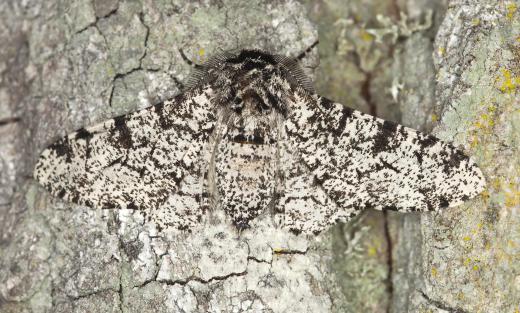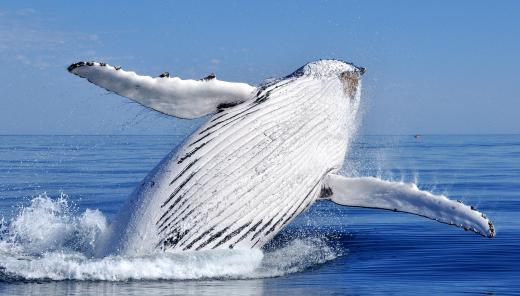What is the Difference Between Microevolution and Macroevolution?
Microevolution and macroevolution are terms used to describe two related phenomena within the field of evolution. A distinction is often made between the terms for the purpose of bolstering the argument of creationism in an attempt to point out a perceived “leap of faith” in the argument of evolution. It is arguable whether there should even be a distinction between microevolution and macroevolution, or whether the terms are used simply as a way of making the evolutionary theory seem unclear. Those who argue that a difference does exist state that the process by which small changes occur within a species through evolution is known as microevolution, while macroevolution defines changes that can create an entirely new species, a condition some people refer to as microevolutionary change.
Microevolution

Changes that occur within a species might be caused by humans — such as the intentional breeding of different types of dogs into new breeds, or cross-cultivating some plants to bring out specific attributes — or they might be the result of natural selection. One of the most common examples of microevolution is the peppered moth in England; during the Industrial Revolution the peppered moth changed its coloring to better blend in with the soot-covered environment.

Creationists usually accept the premise of microevolution based on the argument that evidence of change within a species is visible, and evolution may be observed over the course of a human lifetime. Many creationists find the distinction between microevolution and macroevolution useful because it allows them to accept the existence of microevolution while shrugging off the phenomenon of macroevolution as preposterous. Rather, creationists tend to believe that different species were created by a supernatural being as opposed to the process of macroevolution.
Macroevolution
Macroevolution is evolution that ultimately transcends the species barrier, yielding new species, most likely through a gradual process of what could be termed microevolutionary changes. Macroevolution encompasses changes along the entire spectrum of life, from single-celled organisms all the way to conscious human beings. The evolution of humans from more primitive apes, of whales from land-dwelling mammals, and of complex vertebrates from worms are all examples of macroevolution. Many evolutionists argue that macroevaluation is simply an accumulation of microevolutionary changes.
Does a Difference Exist?
The common creationist argument citing the difference between microevolution and macroevolution holds that, although microevolution is clearly observable, macroevolution is not observable, and therefore requires a leap of faith. Virtually all evolutionists, however, agree on the existence of macroevolutionary processes — though they might argue about the actual processes themselves — but most evolutionists would say that the distinction between microevolution and macroevolution is a fabricated one. Most evolutionsists feel that the difference between the terms is one of scale; in the most common theories of evolution, macroevolution is simply a large collection of microevolutionary changes that accumulate over time until they cause speciation.
Somewhat ironically, the terms microevolution and macroevolution were coined by an evolutionary biologist in the 1930s, who found himself forced to concede that the two processes were equivalent. Although microevolution and macroevolution are still sometimes discussed in the scientific world, their meanings in this context usually indicate a difference of scale, rather than a fundamentally different process. Many evolutionists avoid the terms altogether because they are perceived to have been co-opted by creationists for their own benefit, and some scientists might quip that the only difference between microevolution and macroevolution is a vowel.
AS FEATURED ON:
AS FEATURED ON:












Discussion Comments
@anon166012: It's not the only logical reason. People have religions that they might believe in, and religions usually have their own creation myth. It's called a myth, and although microevoloution is proven to exsist, macroevoloution (species evolving from one another) is in fact also, still a myth.
I hate to throw the religion aspect into the equation, but when you go as far as to say it's the only thing that can be observed and proven, you are in fact implying that religion doesn't have a say so. When you talk about ideas such as this you have to consider people's values and beliefs.
Their are two types of evolutionists as well. The easy going majority and the extremists. Extremists who say "our way or the highway!" This is an attribute of religion and not science. True science allows for all possible explanations and is not die hard on one. The die hards are high priests of a big world wide religion and the rest of us are considered to be dirty infidels!
Seriously, evolution is not a belief. In fact, I do not think that schools teach evolution enough! They do not provide all the questioning and efforts to disprove evolution, which show it to be all the more testable and accurate as a theory. They should also show creationists' attempts to disprove evolution because they showed that in my class here and the creationists tore their own arguments apart and got absolutely no correct information.
So, if you ask me, then in a biology class they should show all sides of evolution to make the theory more obvious and apparent to anyone, so that evolution deniers die out, because, in the long run, they're simply detrimental to society. They should teach evolution more clearly, presenting all sides so that the evidence stares everyone in the face, to the point where it cannot be denied.
"There are methods of including creationism in a more secular way..."
If we don't want students to learn things that contradict thing s that they were taught at home, then there is no need for education at all. Nobody should go to school, because there's too great a risk that what they learn contradicts what they learn at home.
So, folks, are you suggesting that non-science should be taught in science class? How would that work?
They teach the theory of evolution in schools because it is the only observable, testable, logical explanation for the origin of species. A theory is not just an "educated guess" or "idea that a scientist had," it is something that has been observed, hypothesized, tested, analyzed,tested again, re-analyzed, then the results are peer-reviewed, and it is tested again. Creationism cannot and I repeat, cannot be tested, observed, or analyzed in any way.
Subway 11-I think people like that are so inspirational. But back to your point about questioning scientific theories, I agree that there is a backlash if you do.
Take for example, the movie “Expelled” by Ben Stein that was released in 2008.
In this film he exposes the bias against intelligent design in the school system and how there is so much opposition against teaching any other theories besides evolution.
There has to be some constitutional challenge to all of this because how can you teach something that violates a student’s religion and belief system. There are methods of including creationism in a more secular way so that students do not have to hear contradictory information in schools from what they were taught at home.
Until the parents start demanding a change, I am afraid that this trend of teaching evolution in public schools will continue.
Bhutan -I agree with you. The problem is that any time that you question scientific theories in place of a faith based theory you are going to get a lot of opposition from the scientific community which bases everything on facts and only facts.
However we know that are many things that happen in the world that science cannot explain. This is why scientists should be a bit more humble and open to the idea of other possibilities.
Science is wrong all the time. For example, take Lance Armstrong who years ago was diagnosed with stage four testicular cancer.
Not only is his cancer now in remission, but he went on to win the Tour de France several years ago. He defied the scientific odds and so have others.
What I don’t understand is how the subject of evolution is taught in schools, when 70% of the parents believe in intelligent design.
I really feel that the public school system should offer both options to the school children and let them decide which they will believe.
It doesn’t matter if the schools prefer creation or evolution but they should offer both of these theories in order to train students to develop their critical thinking skills and not be indoctrinated into one theory or another.
The theory regarding Charles Darwin’s evolution is really insulting to the belief systems that many studnets of various religious faiths believe.
Our schools should be about teaching not indoctrinating.
Post your comments